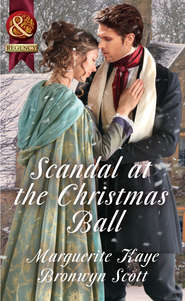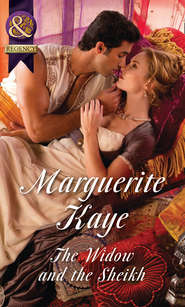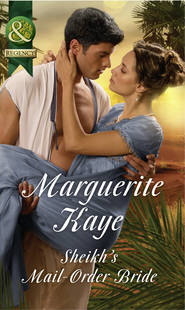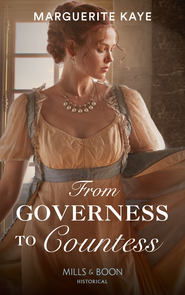По всем вопросам обращайтесь на: info@litportal.ru
(©) 2003-2025.
✖
Scoundrel in the Regency Ballroom: The Rake and the Heiress / Innocent in the Sheikh's Harem
Настройки чтения
Размер шрифта
Высота строк
Поля
Serena froze. Was that his breath she could feel through her petticoats? A quick snip and a lock of silky black hair fell into her hand. ‘There, you can stand up now,’ she managed breathlessly.
He gazed up at her with such a smile that her knees almost buckled. ‘Why don’t you come down here and join me? It’s very—good God!’
‘What is it?’
‘The last rose of summer left blooming alone. I’ve just remembered, it’s a song. And there it is. Come here.’
‘Very funny. Get up.’
‘No, I mean it,’ Nicholas said. ‘Look.’
She carefully placed his curl in her reticule with her scissors and dropped to her knees beside him. He took her by the shoulders and pointed her at the fireplace. Two panels decorated with delicate plasterwork filled the gap on each side between the mantel and the book cases. On one the figure of a man held a flower stalk in his hand. On the opposite panel was a tomb, around and on top of which the petals of the flower were scattered.
‘Oh!’ Serena clapped her hands together in excitement.
‘The last rose of summer. Melissa used to sing it—damned melancholy thing, but it tickled my father. He knew the poet who wrote it, years before it was set to music. I can’t think why I didn’t remember until now. Go on then, they’re your papers, see if you can find the latch.’
The panels were not large, starting from the wainscoting and ending at head height. Carefully, Serena felt her way around the edges of the one on the right, with shaking fingers seeking a gap or a mechanism, but there was nothing. She tried again. Nothing. Disappointed, she sat back on her heels.
‘Maybe it’s on the other one. Let me try.’ Nicholas joined her, kneeling on the floor beside the panel depicting the young man and the flower stalk. As Serena had, he felt his way around the panel. Then he looked more closely at the stalk, which seemed to be detached from the plaster beneath it. Carefully, he twisted it. It turned. The tombstone with its rose petals slid back to reveal a cavity in the wall. Inside lay a small packet sealed with red wax, a name written in faded ink on the front.
Serena reached in. Philip Stamppe, his last will and testament. Her father’s name leapt out from the paper in flowing script. She felt herself go faint, and staggered to her feet.
Nicholas poured her a small measure of brandy. ‘Sit, drink this.’
Serena drank, spluttering as the cognac seared the back of her throat. Then drank some more, savouring the calming effect of the liquor. ‘I’m sorry, it’s the shock, seeing his name, that’s all. I’m better now.’
He was almost as shocked himself, to find that the papers actually existed. As the implications began to make their way into his brain, Nicholas cursed inwardly, for now his precipitate action had ensured that Serena had no further reason to stay and he was not ready for her to go. Not yet.
She turned over the little packet of documents on her lap, but made no attempt to break the seals.
‘Am I permitted to know what they are?’
She was sorely tempted to tell him everything, but to do so would be to call a halt to whatever this thing was between them, and she was not willing to do that. Not yet. ‘My father’s will,’ she conceded, ‘and some papers confirming my identity.’
‘You don’t seem particularly overjoyed to see them.’
She looked up. ‘I expect you are, though. It means I won’t need to trespass on your time any longer.’
‘Must you go straight away?’
‘I ought to.’
‘That’s not what I asked.’
‘I know.’
Nicholas stared frowningly out of the window. ‘Leave it another couple of days and I’ll be able to escort you myself. I should have news of my duelling opponent by then, and in the meantime I can show you a bit of the countryside. Do you ride?’
‘Yes, but—’
‘Good. We’ll go riding tomorrow,’he said decisively.
‘I should go to London tomorrow.’
‘Stay. Let us have a day’s grace, without worrying about papers or panelling or—or anything.’
Serena folded the documents into her reticule along with the lock of Nicholas’s hair as she thought through his suggestion. He had not pressed her as to their content. Did that mean he didn’t care, or he didn’t want to know? And if she stayed another day, what was implied? More than just a gallop across the countryside, or was she reading too much into it? He would not take what was not freely given. She believed him, but she did not trust herself. Already, part of her had rushed ahead like a stampeding horse, looking forward to the morrow. She tried to rein it in. ‘A day’s grace,’ she said. ‘Yes, I’d like that’, though even as she spoke, doubt seized her.
Nicholas took her hand and pulled her to her feet. His smile was warm, drawing from her a response that banished everything save a tingle of anticipation, a rush of pleasure. ‘Come on, then,’ he said to her, ‘I’ll walk you back to your lodgings.’
‘Tiens, I thought you were never coming back, mademoiselle, I was about to send someone out in search of you.’ Madame LeClerc, arms crossed impatiently, greeted Serena from the doorway. Dressed in her habitual black, her pale eyes peering shortsightedly at her charge, she had the look of a well-fed mole startled from its burrow.
‘I’m sorry to have kept you waiting,’ Serena said soothingly. ‘Let’s go in. You’ll be wanting your dinner.’
‘Pah,’ Madame LeClerc said contemptuously, though whether she referred to Nicholas’s retreating figure or dinner was not clear. Once inside, she commenced her habitual lament. ‘I am tired of waiting, Mademoiselle Serena, when will we be on our way?’
‘Not so very long now,’ Serena said patiently, ‘my business is almost concluded.’
‘Business! Is that what you call it. The whole village is talking of you,’ Madame LeClerc said spitefully.
Serena turned from the mirror where she had been tidying her hair. ‘You shouldn’t listen to idle gossip, Madame LeClerc, I’m sure there must be more productive ways for you to pass your time.’
‘What am I to do here, exactly’ Madame responded angrily. ‘The women dress in sacks and aprons. When I try to advise the cook on how to make a nice French ragoût, she orders me from the kitchen. And now there is a strange man pestering me with silly questions.’
‘What strange man?’
‘A round man with a greasy coat. He knocked on the door and talked at me. I don’t know what he said, but I thought he was a person most suspect.’
‘He was probably just lost; I shouldn’t worry about it.’
‘That is all very well for you to say, mademoiselle, but you leave me alone all day when you go off to the big house. What if he had ravished me, what then?’
Serena spluttered with the effort of turning her giggle into an unconvincing cough. ‘I am relieved he did not.’
‘Much you would care if he did!’
Realising that she was genuinely upset, Serena spoke more soothingly. ‘I promise you we won’t be here for much longer. Now let’s forget about strange men, and eat whatever nice English food our landlady has prepared for us before it gets cold.’
They sat down to dinner at the table in the parlour, but Madame was not content to drop the subject of village gossip. ‘They say you spend all day in the company of this Monsieur Lytton. They say that you are his mistress,’ she informed Serena through a mouthful of rabbit pie. ‘They say you must be, given his reputation with the ladies.’
‘I’m not interested in gossip,’ Serena replied sternly.
‘Yes, but, Serena—Mademoiselle Cachet—you should be more discreet; your papa would not be pleased.’
‘C’est mon affaire, madame, none of your business. Since Mr Lytton’s father was one of Papa’s oldest friends, I’ll thank you to hold your tongue. Eat your dinner; I want to hear no more of this.’
It was only village gossip, but it worried her none the less. She did not doubt that much of the speculation had originated from Madame LeClerc herself, but that was no consolation.











